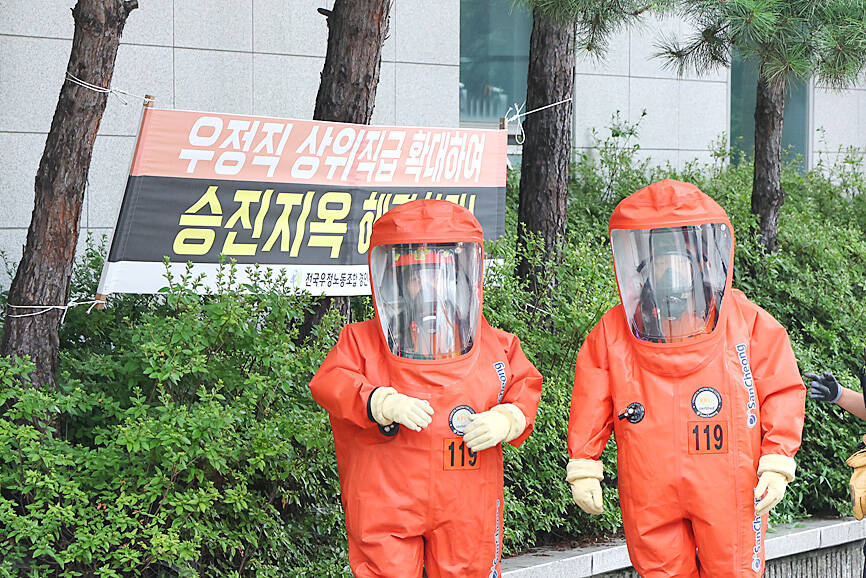Chunghwa Post yesterday announced a series of measures to prevent the delivery of dangerous items through its system.
The state-run company made the announcement after three employees of a care facility in Ulsan, South Korea, on Thursday reported that they had difficulty breathing and were taken to a hospital for treatment after opening a package that had transited through Taiwan.
The postal company traced the origin of the package and found that it was initially sent from China and transshipped to South Korea through Chunghwa Post’s delivery service.

Photo: EPA-EFE
A Criminal Investigation Bureau probe found that the package had been shipped by surface mail from China and sorted through Chunghwa Post’s freight forwarding center during a stopover in Taiwan. It was later shipped directly to South Korea by air, without passing through Taiwan’s customs.
The incident prompted Chunghwa Post to suspend delivery of packages to South Korea commissioned by the Taiwanese logistics firm that received the package from China.
Korea Post expanded its search by tracing the whereabouts of more than 2,500 packages that were sent along with the parcel.
Delivery would not to be resumed until after Korea Post completes its investigation, Chunghwa Post said.
The Taiwanese logistics firm could be fined up to NT$150,000 if it is found to have breached the terms of mail delivery contracts, the post office said, adding that it would be asked to pay additional compensation should Chunghwa Post incur additional financial losses because of the incident.
“In view of this incident, we have asked logistics firms or freight forwarders to accept only items for delivery from logistics firms and suppliers verified by cross-border e-commerce platforms. They are banned from accepting goods from individuals,” Chunghwa Post said.
To increase control over goods that are to be delivered through the mail transshipment system, the postal firm said it would add a vetting system for suspicious items, such as solid aroma compounds and liquid essences, as well as items that were frequently misrepresented on customs reports, such as lip balm and makeup cotton.
Under current regulations, eight categories of items are banned from being delivered through Chunghwa Post’s transshipment service, including sharp metals, valuables, items prohibited from importation by the destination country, live animals, obscene items, dangerous items, narcotic drugs and other prohibited items. Mail would be sent after customs X-ray the packages and confirm that they do not contain problematic content.

The High Prosecutors’ Office yesterday withdrew an appeal against the acquittal of a former bank manager 22 years after his death, marking Taiwan’s first instance of prosecutors rendering posthumous justice to a wrongfully convicted defendant. Chu Ching-en (諸慶恩) — formerly a manager at the Taipei branch of BNP Paribas — was in 1999 accused by Weng Mao-chung (翁茂鍾), then-president of Chia Her Industrial Co, of forging a request for a fixed deposit of US$10 million by I-Hwa Industrial Co, a subsidiary of Chia Her, which was used as collateral. Chu was ruled not guilty in the first trial, but was found guilty

DEADLOCK: As the commission is unable to forum a quorum to review license renewal applications, the channel operators are not at fault and can air past their license date The National Communications Commission (NCC) yesterday said that the Public Television Service (PTS) and 36 other television and radio broadcasters could continue airing, despite the commission’s inability to meet a quorum to review their license renewal applications. The licenses of PTS and the other channels are set to expire between this month and June. The National Communications Commission Organization Act (國家通訊傳播委員會組織法) stipulates that the commission must meet the mandated quorum of four to hold a valid meeting. The seven-member commission currently has only three commissioners. “We have informed the channel operators of the progress we have made in reviewing their license renewal applications, and

Taiwan People’s Party (TPP) Chairman Huang Kuo-chang (黃國昌) yesterday appealed to the authorities to release former Taipei mayor Ko Wen-je (柯文哲) from pretrial detention amid conflicting reports about his health. The TPP at a news conference on Thursday said that Ko should be released to a hospital for treatment, adding that he has blood in his urine and had spells of pain and nausea followed by vomiting over the past three months. Hsieh Yen-yau (謝炎堯), a retired professor of internal medicine and Ko’s former teacher, said that Ko’s symptoms aligned with gallstones, kidney inflammation and potentially dangerous heart conditions. Ko, charged with

Taiwan-based publisher Li Yanhe (李延賀) has been sentenced to three years in prison, fined 50,000 yuan (US$6,890) in personal assets and deprived political rights for one year for “inciting secession” in China, China's Taiwan Affairs Office spokesman Chen Binhua (陳斌華) said today. The Shanghai First Intermediate People’s Court announced the verdict on Feb. 17, Chen said. The trial was conducted lawfully, and in an open and fair manner, he said, adding that the verdict has since come into legal effect. The defendant reportedly admitted guilt and would appeal within the statutory appeal period, he said, adding that the defendant and his family have